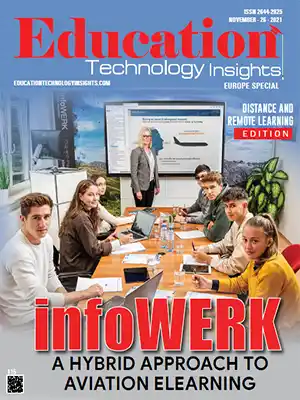THANK YOU FOR SUBSCRIBING
Be first to read the latest tech news, Industry Leader's Insights, and CIO interviews of medium and large enterprises exclusively from Education Technology Insights
Leveraging Technology to Enhance Learning Experience
Rhys Hughes, Head of Learning Services, South Essex College of Further and Higher Education
 Rhys Hughes, Head of Learning Services, South Essex College of Further and Higher Education
Rhys Hughes, Head of Learning Services, South Essex College of Further and Higher EducationIn the past year COVID-19 has had a profound effect on the learning experience of every learner across the world. We have clearly seen that new technologies are there to enable us to enhance our virtual teaching and learning offerings, making life that bit easier for lecturers and learners when communicating in a remote educational setting.
Over the past 12 months, I took the strategic decision to progress the use of technology at South Essex College and the way in which we provide a remote teaching and learning provision for our learners. To achieve this the college invested heavily in a lecture and classroom capture project. The end goal was to deliver a hybrid learning solution that can grow with our requirements to ensure students have access to live lectures and lessons remotely and on-demand. I wanted to provide the best possible learning experience to our students viewing remotely without disrupting those physically present. I also didn’t want to impact teachers or lecturers. Ideally, they need to arrive at class and teach as usual but delivering to both audiences simultaneously. It was essential that the chosen solution didn’t require technical input from teaching staff, freeing them to concentrate solely on delivering their lessons and removing any barriers that might prevent them from engaging.
Lecture and classroom capture has been around for a long time, but I needed to find a solution that fitted South Essex College’s specific needs. It has also historically been a huge cost investment that has put high end solutions out of reach of further and higher education institutes.
The end goal was to deliver a hybrid learning solution that can grow with our requirements to ensure students have access to live lectures and lessons remotely and on-demand
The solution needed to:
1. Have minimal technical requirements for lecturers and teachers.
2. Utilise inexpensive hardware.
3. Provide an excellent experience for both student audiences.
4. Integrate with our virtual learning environment, Canvas.
5. Be scalable across the organisation.
The college already used Planet eStream as its video-on-demand platform. It has always been an excellent platform for storing and managing the college’s digital assets, but I was aware that it also offered live streaming room capture tools; so, I was keen to discover if it could assist me with our project.
Our account manager (Tom Norrey) introduced us to their recently launched lecture capture toolset and South Essex College became the first large install base for this new lecture capture technology. The big draw was that Planet eStream provided a centrally managed platform, with streams and recordings of lectures scheduled in advance and shared via the virtual learning environment. This meant that the college staff didn't have to worry about how to use the technology.
Planet eStream also provided hardware options that offered high-end functionality but at a very reasonable cost. The college purchased cameras that automatically track the lecturer and discreet ceiling-mounted microphones. To ensure we captured the whiteboard and projector content at the highest quality, I used a number of Planet Room Recorder units.
On the 15th of March 2021, thanks to our partnership with Planet eStream and Octopus network, we launched our first live room capture and virtual classroom experience. The response from staff and students has been fantastic, and the college has continued to scale our provision further. We have since been able to offer site visits to institutions interested in understanding our project, how I met the deliverables and how they could potentially leverage the solution to meet their own requirements.
Read Also
Goldilocks Regulation
Beyond the Quiz: Redefining Competence in eLearning
Beyond Theory and Into Monday Morning: Enhancing Graduate Programs for Teachers
Safeguarding Students in the Age of Deepfakes: An Educational Imperative
Delivering Excellence in Education through Transformative School Leadership
Curriculum Innovation for Student Success and Institutional Growth

I agree We use cookies on this website to enhance your user experience. By clicking any link on this page you are giving your consent for us to set cookies. More info























